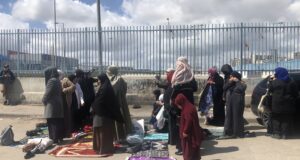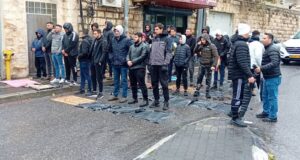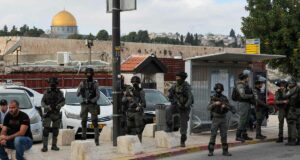from the Grassroots Palestinian Anti-Apartheid Wall Campaign
Connex / Veolia and Alstom are the international investors in the Citypass consortium that will build and run a light rail project in Jerusalem that incorporates a number of Jewish settlements around East Jerusalem, built on stolen Palestinian land. It ensures the contiguity of these colonies with the central areas of the city and plays a key role in sustaining the settlements and ensuring they become a permanent fixture upon Palestinian land.
Veolia’s involvement in the tramline makes the company complicit in Israel’s violations of international law reaping significant profits over a 30 year period, money stained with the blood and misery of Palestinians under Occupation and currently being expelled from Jerusalem.
Veolia has rejected to heed the calls from Palestine and international organizations.
Thus international pressure is mounting on the corporation to stop their involvement in the Judaization of Jerusalem.
* Connex shuttles have been blockaded in Geneva.
* Following protests by trade unions and IPSC in August 2006, Veolia Transport Ireland had called off plans to train Israeli personnel to operate the tramline in Jerusalem.
* In November the Dutch ASN Bank decided to divest from Veolia until the company respects the relevant UN resolutions.
Support us in putting further pressure on Veolia!
Address the advisors of the Institut Veolia Environnement, the group’s prestige institute aiming to “propose a forum for dialogue and interchange with academia, institutions and the different actors in society.”
Ask the intellectuals associated with the institute to re-consider their support of Veolia as long as Veolia supports violations of Palestinian rights!
To:
Foresight committee Institut Veolia Environnement:
Amartya Sen: ree23@cam.ac.uk (cc weiner@fas.harvard.edu )
Philippe Kourilsky: caput@pasteur.fr
Pierre Marc Johnson: pjohnson@heenan.ca
Harvey Fineberg: fineberg@nas.edu
Mamphela Ramphele: aesmar@bremner.uct.ac.za
Helene Ahrweiler: (no email available)
cc: Georges Valentis: georges.valentis@institut.veolia.org
(Managing Director of Institut Veolia Environnement)
>From :
Name/Organization:
____________________
____________________
Date: ____________
Open letter to the Foresight Committee members of the Institut Veolia Environnement
Dear Foresight Committee members,
We are addressing you in your capacity as experts supporting the efforts of Institut Veolia Environnement.
We know that all of you have dedicated a great part of your life and expertise to the promotion of human rights and social, economic, cultural and political rights of people all over the world. We appreciate your commitment and are writing you now to urge you to continue your support for human rights for all.
We would like to inform you about the implications of your association with the Institut Veolia in terms of its’ violations of international law, UN resolutions, and Palestinian human rights and cultural heritage.
As you may know, Veolia, together with Alstom, are the international investors in the Citypass consortium that won a 2002 tender put out by Israeli authorities for a light rail transportation project in Jerusalem amounting to around 500 million euros. Citypass will be responsible for operation and maintenance of the system for the next thirty years.*
The path of the light rail incorporates a number of Jewish settlements around East Jerusalem, built on stolen Palestinian land. It ensures the contiguity of these colonies with the central areas of the city and provides them with a vital transport link. The project boasts that the “Ammunition Hill” station of the network will operate as the feeder station for settler traffic from Ma’aleh Adumim, a large Israeli settlement in the West Bank, and from settlements in the West Bank’s Jordan Valley. The light rail project plays a key role in sustaining the settlements and ensuring they become a permanent fixture upon Palestinian land.
In August 2005, the project got the go ahead from War Criminal Ariel Sharon who stated at a signing ceremony: “I believe that this should be done, and in any event, anything that can be done to strengthen Jerusalem, construct it, expand it and sustain it for eternity as the capital of the Jewish people and the united capital of the State of Israel, should be done.” The Occupation’s Mayor Uri Lupolianski described the light rail to be “the fulfillment of Psalm 122.” The tramline is clearly part of a larger plan to substitute Jerusalem’s historical and unique social fabric and its cultural heritage with a new brand of a “Judaized” version of Jerusalem.
According to international law, an occupying power is not allowed to annex or drastically change the infrastructure in the territories it occupies. The advisory opinion of the International Court of Justice in July 2004 confirmed that Israel is an occupying power and that building the Wall and Jewish settlements in occupied Palestinian territories is illegal. However, the tramline project runs through the occupied Palestinian territories. Veolia’s involvement in the tramline will make the company complicit in Israel’s violations of international law.
The project, a private-public partnership (PPP) between the Israeli Occupation government and the consortium, is hinged upon the willingness of international business groupings to provide a huge injection of capital. In turn Veolia and Alstom will reap significant profits and dividends over a thirty-year period, money stained with the blood and misery of Palestinians under Occupation and currently being expelled from Jerusalem.
Veolia has received a lot of criticism since it first announced its intentions to become involved in the illegal project. Stop the Wall and other Palestinian civil society organizations have launched appeals against its participation in the tramway. President of the Palestinian Authority Mahmoud Abbas and French President Jacques Chirac already discussed Veolia’s partnership in the tramline project in the summer of 2005. Amnesty International France highlighted the unlawfulness of the construction of the tramline in East Jerusalem in a public statement on 1 March 2006.
The Ireland Palestine Solidarity Campaign (IPSC) revealed in August 2006 that Veolia Transport Ireland had called off plans to train Israeli personnel to operate a similar tramline in East Jerusalem, following trade union protests inspired by the IPSC.
Then in November the Dutch ASN Bank ended its relationship with Veolia and wrote to Veolia:
“….We believe that Veolia’s involvement in the light rail project is not in line with the UN’s demand to stop all support for Israel’s settlement activities, and is therefore not in line with ASN Banks’ social criteria. Due to the direct nature of Veolia’s involvement (through a 5% stake in the consortium and as future operator), we are of the opinion that Veolia’s activities in Jerusalem are in conflict with UN Resolutions. Therefore, on this current information Veolia will be removed from our investment universe.”
In the light of the above, we urge you to take a stand for justice and international law and to join the international efforts to convince the Veolia group to consider the role human rights should play in investments.
We ask you to re-consider your support of Veolia as long as Veolia supports violations of our rights and international legality.
As Veolia has not heeded the calls from Palestine and various international organizations, ending your relationship with Veolia—just as the ASN Bank did—will allow you to truly “participate in defining the overall direction and contribute to the discussions led by the Institut Veolia Environnement.”
Regards,
Signature
 International Solidarity Movement Nonviolence. Justice. Freedom.
International Solidarity Movement Nonviolence. Justice. Freedom.


